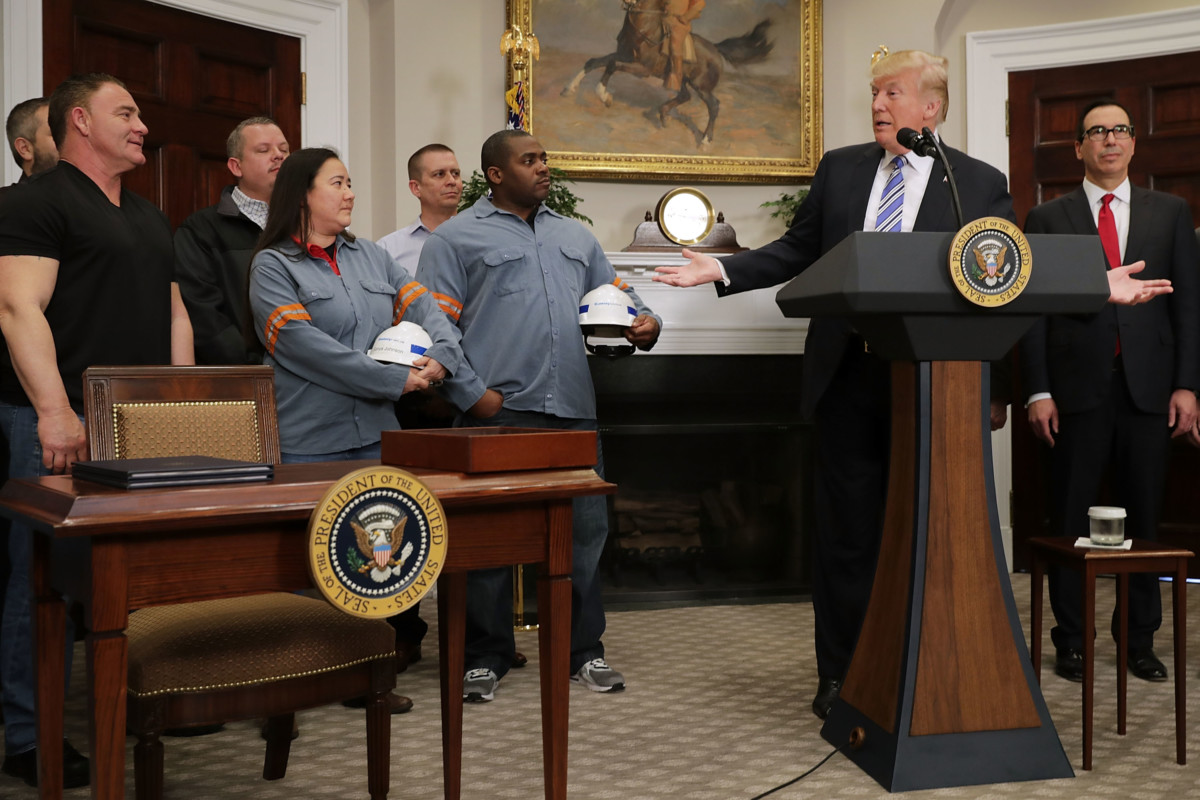In his escalating trade war with China, Donald Trump is acting increasingly like Captain Queeg in the Caine Mutiny. He has imposed a 10 percent tariff on $200 billion in US imports from China, a rate he proposes to increase to 25 percent at the start of the next year. He also is threatening tariffs on the rest of our imports from China, an additional $300 billion in goods and services.
The straight arithmetic tells us that 10 percent of $200 billion is $20 billion on an annual basis. If this rises to 25 percent next year, the tariffs would be $50 billion. If we add in 10 percent tariffs on another $300 billion, that comes to $30 billion, bringing the total to $80 billion.
While Trump talks as though he thinks his tariffs are taxing China, they aren’t. Most immediately, they are a tax on US households. The full $80 billion would come to a bit less than $600 per household.
It is true that the tariffs will not be passed on dollar for dollar. Some companies will decide it’s better to see their profit market squeezed than pass on the full price increase. This means that Apple and Nike may not raise the price for the iPhone and running shoes by the full amount of the tariff.
In that case, a portion of the tax will be borne by US companies manufacturing items in China. This is fine, since corporate profits are near record highs as a share of GDP. But, this is still not taxing China.
There will be some spillovers where either Chinese companies importing items to the US end up with less money or Chinese suppliers selling to US companies are forced to accept less money, but there is little doubt that the bulk of the tariff will be borne by the US. Trump is effectively proposing one of the largest tax increases on the middle class in memory.
The higher taxes paid by households in the United States could still be a reasonable policy if Trump were pursuing an important and winnable goal. In fact, during his campaign he repeatedly attacked China’s currency policy and insisted he would make changing it a top priority from the first day he was in office.
China’s currency policy is an important issue. If the dollar were 20 percent lower against the Chinese currency, it would go far toward reducing our trade deficit. As a first approximation, it would make Chinese goods and services 20 percent more expensive for people in the United States, and US goods and services 20 percent cheaper for people living in China.
This sort of change in currency values is also likely a winnable goal. China had been raising the value of its currency relative to the dollar over the last decade. This is one reason its trade surplus has fallen so sharply from almost 10 percent of GDP in 2007 to just over 1 percent of GDP today.
Presumably, Trump could have gotten China to agree to a schedule of further increases in the value of the Chinese yuan. China would certainly not agree to a big jump in the value of its currency overnight, which would be disruptive to its economy, but a substantial rise over a period of two to three years would be very manageable for China.
But currency seems to have disappeared from Trump’s agenda now that he is actually in a position to do something. Instead, we get a set of poorly specified and frequently shifting complaints against China.
Trade is not about one country winning and another country losing. Interests within some countries win, while others lose. When millions of manufacturing workers in the Midwest were losing their jobs in the last decade, US corporations that were importing items made in China — like General Motors, Apple, and Walmart — were winning. This simple and obvious point seems completely lost on Donald Trump, who seems to think that the balance of imports and exports is a scorecard.
This Trumpian confusion must be kept front and center in understanding Trump’s trade wars. While lowering the value of the dollar and reducing the trade deficit in manufactured goods would benefit most US workers, the items on Trump’s agenda largely go the other way. He continually rants about China stealing our intellectual property.
If China pays Microsoft, Pfizer and Boeing more money for their intellectual property claims, it will lead to a larger trade deficit on manufactured goods. That story is good for people who own lots of stock in these companies, but bad news for most everyone else.
So in Donald Trump’s trade war with China, most of us can look forward to paying higher taxes. If he somehow manages to win (and not just claim victory over nothing), it will mean more money for shareholders and fewer US jobs in manufacturing. This is not a good story for the country’s workers.
Press freedom is under attack
As Trump cracks down on political speech, independent media is increasingly necessary.
Truthout produces reporting you won’t see in the mainstream: journalism from the frontlines of global conflict, interviews with grassroots movement leaders, high-quality legal analysis and more.
Our work is possible thanks to reader support. Help Truthout catalyze change and social justice — make a tax-deductible monthly or one-time donation today.
